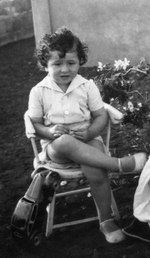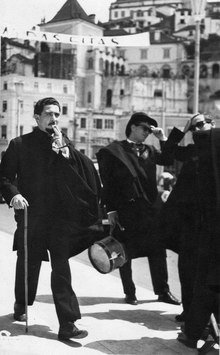This is an old revision of this page, as edited by AtlanteanAstorian (talk | contribs) at 00:04, 29 December 2024 (Created by translating the page "Rui Nepomuceno"). The present address (URL) is a permanent link to this revision, which may differ significantly from the current revision.
Revision as of 00:04, 29 December 2024 by AtlanteanAstorian (talk | contribs) (Created by translating the page "Rui Nepomuceno")(diff) ← Previous revision | Latest revision (diff) | Newer revision → (diff)Rui Firmino Faria Nepomuceno ComIH (Funchal, 10 May 1936 - Funchal, 18 April 2024) was Madeira-born Portuguese lawyer, politician and historian.
Biography
Early years

The son of embroidery industrialist João Nepomuceno and Maria da Paixão de Faria Nepomuceno, he was born in Santa Maria Maior, Funchal, Madeira, on 10 May 1936.
Rui Nepomuceno was born into a bourgeois family, the eldest of five siblings.
Living very cheaply, he lived in a traditional Madeiran quinta on Rua Coronel Cunha in Santa Maria Maior, Funchal.
Academic career

Initially, Rui Nepomuceno attended Colégio Nun'Alvares, known as Caroço, where he completed his primary education. He went on to study at the Liceu Nacional in Funchal. He then attended the Grande Colégio Universal in Porto, finishing at the Colégio Almeida Garrett.
At the end of his high school studies, in 1957, he applied for Legal Sciences at the Faculty of Law of the University of Coimbra.
During his time in Coimbra, he quickly became involved in the student movement and the fight against the regime. He took part in the academic struggles against the Salazar dictatorship, accompanying communist students in a mix of “bohemia and political activism”.
In 1960, Nepomuceno supported the opposition ticket that won the elections for the Academic Association of Coimbra over the Situationists, with Carlos Manuel Natividade da Costa Candal (1938-2009) elected as President of the Board, at a time when student protests against teaching erupted. superior to the Estado Novo regime and the colonial war. In the same group, there were other supporters, for example Manuel Alegre (1936), José Carlos Vasconcelos (1940), Fernando Assis Pacheco (1937-1995), José Augusto de Silva Marques (1938-2016) and other protagonists of the struggles academics.
In 1958 he belonged to the Support Committee for Dr. Arlindo Vicente (1906-1977) - a lawyer proposed by the Communist Party - to the elections for the Presidency of the Republic, who ended up giving up in favor of the unitary candidacy of General Humberto Delgado (1906-1965).
Colonial War

Even before the outbreak of war, Nepomuceno interrupted his university studies in 1959 to attend the Militia Officers' Training Course at the Infantry Training School in the Mafra Convent. According to the Military Lieutenant's Individual File, Rui attended the Course from September 5, 1959 to January 30, 1960. Promoted to midshipman, he served in the 19th Infantry Battalion of Funchal.
Shortly after becoming available, in April 1961, Nepomuceno was called up to report to the Barracks of the Infantry Regiment no. 4 in the Algarve, in Faro, with the purpose of commanding the 1st platoon of the Companhia de Caçadores no. º 167, then commanded by Captain Mário Firmino Miguel (1932-1991), mobilized to fight in Angola.
After a short hesitation, as he considered himself a defender of people's rights to self-determination and independence, he decided to leave for the unknown that was this war and not take refuge abroad, as many young people descended from wealthy families did.
In fact, Nepomuceno had the economic possibilities to do what many did at the time: the leap into exile in France. But he didn't.
In this sense, he joined the Battalion of Hunters No. 159, led by Lieutenant Colonel Carlos Fernando Teixeira da Câmara Lomelino, a Madeiran who was replaced in October 1961 by Lieutenant Colonel of Infantry Manuel Pereira Espadinha Milreu.
Mobilized in Angola, he shared with his wife, Aida Maria Brito Figueiroa Góis Nepomuceno, a fellow Madeiran.
During his military service, he also tried to move politically. In Angola, in 1962, he joined the Communist Party, at the invitation of Manuel Alegre.
The "Poors' Lawyer"
After obtaining his law degree, he settled in Funchal. He registered with the Madeira Regional Council's Bar Association in 1968.
In 1990, he became a member of the Council of the Portuguese Bar Association on the list of Alcino Cabral Barreto. In 1992, he became a member of the District Council of the Portuguese Bar Association of Madeira, on 22 January; and on 18 January 2002, he became vice-president of the Deontological Council of that order.
For many years, he worked as a lawyer on Madeira Island, and is still known today as the “lawyer of the poor”. Initially, he specialized in Civil Law and Commercial Law. Later, he distinguished himself in Criminal Law.
Marriage and Family

Rui Firmino Faria Nepomuceno and Aida Maria Brito Figueiroa Góis were married on May 3, 1962, at the Nossa Senhora de Fátima de Parede Church in Cascais. Together they had four children.
Portuguese Communist Party
As an anti-fascist, he was active in the democratic opposition, demanding democracy and political autonomy for Madeira Island. In the 1960s and 1970s, Nepomuceno joined his allies and supporters in secret, limiting himself to participating in unitary movements, and the newspaper Comércio do Funchal.
His contribution in 1969 stands out, when he signed the historic “Letter to a Governor”, which, in addition to criticizing the regime, called for Democracy and Political Autonomy for the Madeira Archipelago.
After April 25, 1974, he committed himself to organizing the Communist Party in Madeira. He became a CDU deputy to the Regional Legislative Assembly in 1993, and President of the Civil Parish Assemblies of Santo António and São Martinho, in Funchal.
Honours
During his life path, Rui Nepomuceno was honored and distinguished several times, due to his invaluable contribution to the History of Madeira.
- In 2009, on June 10, he was awarded the degree of Commander of the Order of Infante D. Henrique by the President of the Republic, for his career and cultural work.
- The following year, on May 19, he distinguished himself with the Medal of Honor from the Portuguese Bar Association, for his high merit and honorability in the practice of law, and also for his relevant services to the Order and in the defense of law and the Rule of Law.
- In 2012, on April 12, with the Jorge Amado Medal of Cultural Merit, from the Brazilian Institute of International Cultures, for services to Culture.
- In 2013, on November 1st, he was honored by Clube Futebol União, in the celebration of União's centenary, not only for his contribution during the time he held the position of president of the Board, but also in honor of his father, former President of the Club.
- On July 1, 2015, awarded the Autonomous Insignia of Valor, from the Autonomous Region of Madeira, for his performance and professional virtues. On March 3, 2016, honored on the 437th anniversary of the Parish Council of São Martinho do Funchal.
- On May 19, 2018, he received the Medal for 50 Years of Registration at the Solemn Session to Celebrate Lawyers' Day.
- In the same year, more precisely on November 29, he became distinguished by the Government Council as one of the personalities of recognized merit, integrating the Honor Committee of the Mission Structure for the Celebrations of the 600th anniversary of the Discovery of Madeira and Porto Santo , belonging to the group of 47 individuals who, whether in the economic, political, sporting and religious sphere, are recognizable for their value, merit and excellent work.
- No dia 1 de dezembro de 2018, homenageado pelo secretário-geral do partido, Jerónimo de Sousa, na sessão de abertura do X Congresso Regional do Partido Comunista.
Literary Work
From an early age, he had the desire to write about his land, to carry out real research on his region. In this sense, he carried out intense research into the historical and cultural past of the Madeira Archipelago. This investigation, which lasted decades, resulted in a range of writings left to all Madeirans, in particular, and to the Portuguese, in general. Today he is recognized as an outstanding historian. In addition to having released nine books, he wrote more than a hundred articles of a historical, literary, political and sociological nature in various local periodicals, namely in Comércio do Funchal, in Diário de Notícias, in Funchal Notícias, Garajau ' – Forum Madeira Cruel, in Ilharq, in Islenha, on Margem; in Militante, in Quebra Costas , among others.
Publications
- 1994: As Crises de subsistência na História da Madeira. Lisboa: Editorial Caminho.
- 2003: Uma perspetiva da história da Madeira. Funchal: Editorial Eco do Funchal.
- 2006: História da Madeira: uma visão actual. Porto: Campo das Letras.
- 2006: A conquista da autonomia da Madeira: os conflitos dos séculos XIX e XX. Lisboa: Caminho, D. L.
- 2008: . A Madeira vista por escritores portugueses (séculos XIX e XX). Funchal: Funchal 500 Anos.
- 2012: A Revista das Artes e da História da Madeira. Câmara de Lobos: O Liberal.
- 2014. A Madeira na Obra de Escritores Portugueses. Câmara de Lobos: O Liberal.
- 2023. O Movimento Democrático na Madeira e no Continente (Séc. XIX e Séc XX). Caniço: Jóias de Cultura.
He passed away on April 18, 2024, in the city of Funchal. In honor of his legacy and merit, a proposal was made to name a street in Funchal after him, and it was unanimously approved by the Municipal Assembly.
- "Falecimento do Dr. Rui Nepomuceno". Resultado da busca de "Rui Nepomuceno advogado". Ordem dos Advogados Portugueses. Retrieved 2024-06-10.
{{cite web}}: CS1 maint: others (link) - "Entidades Nacionais Agraciadas com Ordens Portuguesas". Resultado da busca de "Rui Firmino Faria Nepomuceno". Presidência da República Portuguesa. Retrieved 2020-09-07.
{{cite web}}: CS1 maint: others (link) - "Medalha de Honra da Ordem dos Advogados". Resultado da busca de "Medalha de Honra da Ordem dos Advogados Portugueses". Ordem dos Advogados. Retrieved 2024-06-09.
{{cite web}}: CS1 maint: others (link) - "Jaime Ramos na Comissão de Honra dos 600 anos". Resultado da busca de "Comissão de Honra da Estrutura de Missão para as Comemorações dos 600 anos do Descobrimento da Madeira e do Porto Santo - Rui Nepomuceno". Emanuel Silva no Jornal Funchal Notícias. Retrieved 2024-06-09.
{{cite web}}: CS1 maint: others (link) - "Jerónimo de Sousa distingue mérito do histórico Rui Nepomuceno no Congresso Regional do PCP". Resultado da busca de "Jerónimo de Sousa, na sessão de abertura do X Congresso Regional do Partido Comunista e Nepomuceno". Rosário Martins no Jornal Funchal Notícias. Retrieved 2024-06-09.
{{cite web}}: CS1 maint: others (link) - "'O Movimento Democrático na Madeira e no Continente' de Rui Nepomuceno 'chega' à Livraria Esperança". Resultado da busca de "O Movimento Democrático na Madeira e no Continente (Séc. XIX e Séc XX). Caniço: Jóias de Cultura.". Sara Ricardo no Jornal Diário de Notícias da Madeira. Retrieved 2024-06-09.
{{cite web}}: CS1 maint: others (link) - "Rui Nepomuceno 'dará' nome a uma rua do Funchal". Resultado da busca de "Rua Rui Nepomuceno". Paula Abreu no Jornal da Madeira. Retrieved 2024-06-10.
{{cite web}}: CS1 maint: others (link)